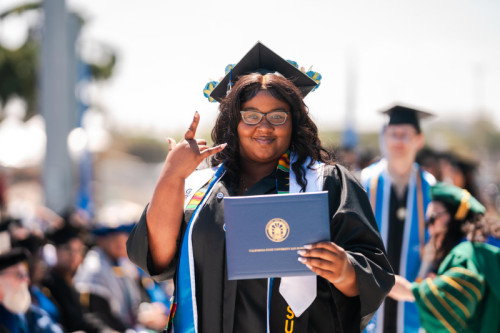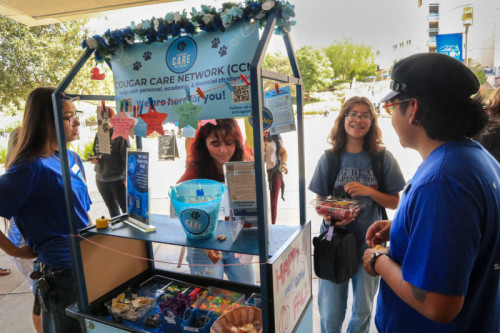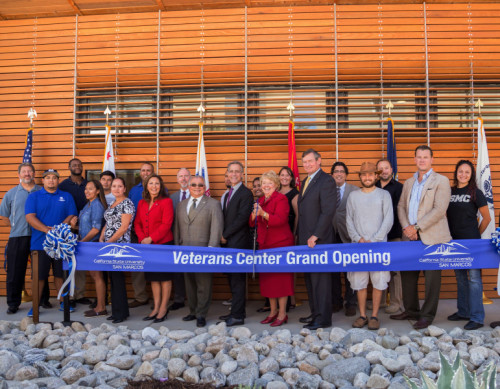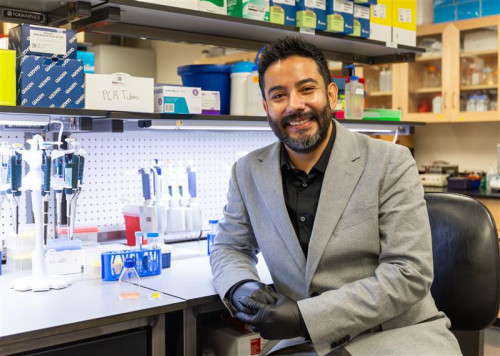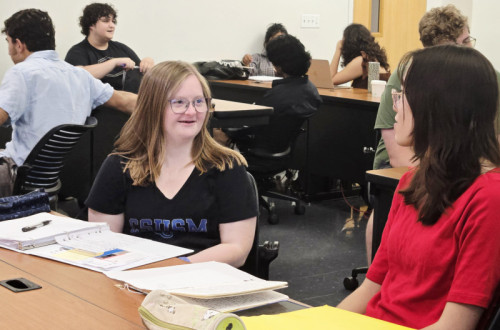CSUSM Places Highly in U.S. News Best Colleges Rankings
23
September
2025
|
08:18 AM
America/Los_Angeles
By Rae Lynch
"; items += "
"; items += "
"; items += "
" + val['title'] + "
"; if(val['subtitle']){ items += "
" + val['subtitle'] + "
"; } items += "
"; if ((val['showpublishdate'] !== 0 && showPublishDateHeadlineSetting) || showPublishCityHeadlineSetting) { items += '
'; if (val['publishcity'] && showPublishCityHeadlineSetting) { items += '
' + val['publishcity'] + '
'; } if (val['showpublishdate'] !== 0 && showPublishDateHeadlineSetting) { items += "
"; items += "
" + date_month + "
"; items += "
" + date_day + "
,"; items += "
" + date_year + "
"; items += '
'; items += ' | '; items += '' + val['publish_time'] + ''; items += 'America/Los_Angeles'; items += '
'; items += '
'; } items += '
'; } items += "
" + val['message'] + "
"; items += "
Read more
"; items += "
"; items += ""; items += tags_items; items += multimedia_count; items += "
"; } }); items +="
"; if (1 > 1) { pp_jquery(".pp_blockheadlines_items-7503760").append(items); } else { pp_jquery(".pp_blockheadlines_items-7503760 .pp-headline-block").hide().css("opacity","0"); pp_jquery(".pp_blockheadlines_items-7503760").append(items); pp_jquery(".pp-headline-block:visible").animate({"opacity":"1"},300); } }); } pp_jquery(window).on('load', function() { /** * targets calcEqualHeights function (modules_v2h.js) * calculates consistent height for all visible items per block module */ pp_jquery('.pp_blockheadlines_items-7503760 .pp-headline-block').each( function() { PP_MODULES.calcEqualHeights(this); }); }); pp_jquery(document).ajaxComplete(function() { /** * when using block item nav button calcEqualHeights * function (modules_v2h.js) will be executed */ pp_jquery('.pp_blockheadlines_items-7503760 .pp-headline-block').each( function() { PP_MODULES.calcEqualHeights(this); }); });
Latest News Release
- Cougar Care Network Marks 10 Years as a Campus Hub for ConnectionBuilt on listening first and guiding without judgment, the Cougar Care Network enters its second decade as a trusted stop for students seeking practical help, community and a path forward. The Cougar Care Network (CCN) launched in fall 2015 as part of Cal State San Marcos’ Early Support Initiative within the Student Outreach and Referral (SOAR) program. Patty Diaz worked in Student Affairs and was the SOAR coordinator. Today, Diaz is the coordinator of CCN. “It’s an incredible feeling to witness something you’ve helped build flourish,” Diaz said. “I’m proud of what Cougar Care Network has become and the positive reputation it has gained among students, faculty and the entire campus community. Together we are making a real difference in the lives of students.” SOAR was the primary referral source for faculty teaching first-year and underserved students. It operated like a concierge: students visited the office, where they were routed to other campus support systems, such as counseling or academic services. In fall 2016, SOAR rebranded as part of CCN. Today, CCN is a trusted place for students to build community while at CSUSM. “It’s fantastic,” said Donna Davis, CCN director. “It’s wonderful that the university has embraced us so much. And students know enough about us to walk right in with anything on their minds, knowing they can get some help. So we are honored by that every day.” Davis joined CCN in 2022 and became the program's director in 2023. “This team, they care so deeply,” Davis said. “We have a very dedicated group of professionals here that are creative, energized and excited to help students. I am so beyond honored to work with this group, and that is what’s kept me here through it all.” As CCN has grown over the past decade, so has the number of students it serves. During the 2024 academic year, it managed 4,620 student cases, a 58% increase from the previous year, according to CCN. There were an average of 20 new cases each day, and students expressed appreciation for the ease of being able to drop into the office to get immediate help with their concerns. While CCN does not offer long-term therapy, a majority of the cases involve mental health. The staff can provide advice and resources for issues like day-to-day anxiety, the stress after failing a test, or the emotional rollercoaster of going through a breakup. The team also helps students take their first step toward visiting counseling services on campus. “We spend a lot of time walking beside students until they are ready to take that step,” Davis said. Visiting CCN is easy and accessible. Students can email or submit a referral form to schedule a visit, or drop in to Administrative Building 1200, Monday-Friday from 9 a.m. to 5 p.m. Professors can refer students and an assigned staff member will reach out to the student to check in and invite them to visit. “Once we connect with them, we’re always going to make that person feel as comfortable as they can,” Davis said. One way CCN helps students feel comfortable during their visits is by offering a treasure chest in the office. Filled with items like facial masks, notebooks, fidget toys and mugs, the treasure chest began as a form of staff appreciation and evolved into a fun activity for students to engage with during their visits. The treasure chest also offers students the opportunity to visit the office and become familiar with the staff while they’re still deciding if they’re ready to talk to someone. Another entry point is the Cougar Care Network cart, introduced in the fall of 2023. The cart is operated by service-learning students as an informal, peer-to-peer way for students to learn more about the program and build connections at CSUSM, so they know support is available. “We are students ourselves. We’re not faculty or staff,” said Fernando Vasquez Rendon, a fourth-year psychology major and service-learning student with CCN. “Knowing that we’re also students adds a sense of trust and relatability.” Vasquez Rendon said he understands why some students may feel nervous about approaching the cart, and encourages them to interact with it and see what it has to offer. He said students often express gratitude for the cart, those who work it, and the free items and resources it carries. “Please, come up to the cart. We’re always happy to chit-chat,” he said. “I’m always open and I really want students to know that I and the team are here to really listen and support.” “One of the best parts is seeing a student for the first time and their interaction with the cart. Those interactions are what make this role beautiful, and I think those moments are really important.” CCN also uses the cart as a tool to help students connect with the University Student Union centers. For example, Davis explained that for students curious about the Pride Center but hesitant to walk alone, the card serves as a bridge, as students might walk into the center when the cart is there. “We know that there needs to be this kindness movement right now,” Davis said. “We know students are isolated and lonely. And regardless of how much social media they have — and the people they can connect with online — they’re still feeling alone on the inside. So the cart was started as a way to go over to students who are sitting alone and introduce them to the cart, because sometimes that’s the only person that student may talk to all day.” Lizet Palestina, another service-learning student with the CCN and a criminology major in her final semester, shared how she uses the cart to start conversations with students sitting alone. “I think it’s easier for students to talk to us, rather than a staff member,” Palestina said. Once the conversation is underway, Palestina and other service-learning students take the opportunity to inform students about campus resources, such as the CCN, Student Health and Counseling Services (SHCS), the Cougar Pantry and workshops. “There are a lot of students who are by themselves, and sometimes they’ll be nervous. But once you get the conversation going, they’re a lot more open,” she said. “It’s as simple as asking if they want a little duck, and then you keep the conversation going.” The mini ducks are one of the main reasons students approach the cart. Vasquez Rendon said it's common to see students visiting the cart to add more ducks to their collection. The ducks serve as a small symbol to remind students that they’re not alone. “Put it in your pocket, keep it in your book bag. But take it out and physically hold onto it as a reminder that we believe in you and know that you got this,” Davis said. Along with the standard mini ducks, CCN also releases special edition ducks for campus events. During a Commuter Breakfast event, the cart featured ducks in cars. In a previous collaboration with SHCS, a duck in a fry basket was offered in reference to the F.R.I.E.S. program on consent. F.R.I.E.S. describes consent as something freely given, reversible, Informed, enthusiastic and specific. CCN also rotates the cart's theme and available items based on cultural events and student feedback. Vasquez Rendon shared that the team is working to update the cart's theme for Dia de los Muertos and to provide cultural information about the holiday. “The cart is always changing as the student population changes,” he said. “I want students to know that the conversations we have don’t fall on deaf ears. If they bring up questions, comments or concerns, I always relay it back to the team.” Alongside the service-learning students, CCN also has a staff of Master of Social Work (MSW) interns who provide support to students. Vasquez Rendon plans to apply to the MSW program for the fall 2026 cohort. Davis shared that community donations and grant funding are crucial to ensuring that CCN can provide students the support they need. CCN is a part of the university's Community of Care program, an intentionally connected network to support students that was made possible by a generous grant from the Conrad Prebys Foundation. CCN also received philanthropic funding from a San Diego Foundation mental and behavioral health-focused grant to be able to staff MSW interns. “We’ve been very blessed with the grants, and they allow our MSW interns to dedicate their full attention to the students," Davis said. Community donations often help stock the treasure chest at the Cougar Care Network office. Davis said they are always welcoming new or gently used physical donations and added that students donate items like candles, facial masks and other small gifts they no longer need. Ten years in, CCN remains focused on simple ideas that matter, starting with a warm welcome and practical help that arrives when students need it. The aim is to walk beside each person until the next step feels possible and the path forward is clear. “We’re here to walk beside you,” Davis said. “And if you’re not ready today, no worries. Maybe you’ll chat with somebody at the cart or follow us on Instagram. Just in case you need us, we’re here.” Media Contact Eric Breier, Interim Assistant Director of Editorial and External Affairs ebreier@csusm.edu | Office: 760-750-7314
- In Memoriam: Josh Pack (’97), a Life of Leadership, Generosity and HeartCal State San Marcos is mourning the passing of distinguished alumnus Joshua Pack ('97), who died on Sept. 29. A devoted husband and father, proud Cougar, and tireless advocate for veterans and students, Pack leaves behind a legacy defined not only by professional success but also by kindness, humility and a deep commitment to helping others. Pack’s path to CSUSM wasn’t straightforward. After beginning his higher-education journey at the U.S. Air Force Academy and transferring to another university, he eventually found his home at San Marcos, where he earned a bachelor’s degree in economics in 1997. He often credited a CSUSM economics professor with transforming his academic trajectory and helping set the foundation for his career. Professionally, Pack rose to become co-CEO of Fortress Investment Group, one of the world’s leading investment firms. Over more than two decades, he built a reputation as a leader in credit and real estate investing, overseeing billions of dollars in assets and guiding teams through complex financial markets. Pack’s connection to CSUSM remained strong long after graduation. He gave his time and expertise as a member of the CSUSM Foundation Board from 2011-16, including service on the Fundraising Committee, where his vision helped strengthen the university’s philanthropic efforts. He also supported the Finance Society by offering real-world insights to students preparing for their own careers. Pack’s passion for serving veterans was rooted in his upbringing as the son of Lt. Col. A.J. Pack, a U.S. Marine Corps officer who served for 22 years. Like Josh, Lt. Col. Pack served as a director of the CSUSM Foundation Board (2015-21). In his father’s honor, Josh established the Lt. Col. A.J. Pack Veterans Scholarship at CSUSM, supporting military-affiliated students in pursuing their educational and career goals. He also championed the creation of a veterans and military center on campus, which broke ground in 2013, calling the work “enormously gratifying for me and my family.” In 2014, he partnered with the Veterans Center and Associated Students, Inc., to host the campus premiere of “The Hornet’s Nest,” a documentary about American troops in Afghanistan. The event included a post-screening Q&A with military units and filmmakers, underscoring his belief in the importance of recognizing and supporting student veterans. In 2021, Pack reflected on his connection to CSUSM in an article on the Fortress website, noting how meaningful it was to help create a leading center for veterans and active-duty service members at the university. “The CSUSM veterans community has earned not just our thanks, but our commitment to support their dreams,” he said. Pack will be remembered for the generosity he showed to his alma mater and to the veteran community that meant so much to him. Through the Lt. Col. A.J. Pack Veterans Scholarship, his support of campus programs and his advocacy for military-connected students, he built a legacy of service that will continue to impact lives for years to come. Pack is survived by his wife and their four children. “Josh was a true partner in our mission of student success,” CSUSM President Ellen Neufeldt said. “He had an unwavering belief in the power of education, and he never forgot where he came from. His impact on our students, and especially our student veterans, will endure for generations, and we will carry forward his spirit of service with gratitude.” Media Contact Eric Breier, Interim Assistant Director of Editorial and External Affairs ebreier@csusm.edu | Office: 760-750-7314
- Civil Rights Office Offering Enhanced Reporting ToolsCal State San Marcos' Title IX/DHR office is enhancing how cases of discrimination, harassment and retaliation are managed. While your role in supporting students and colleagues remains unchanged, these improvements mean a better experience for those who seek help. What You Need to Know Students and employees can continue to report concerns in the same way. Confidentiality and support remain the office's top priorities. Reports that you refer will be handled faster and more consistently. The office can provide clearer updates and resources throughout the process. Why This Matters Case handling will be more efficient and less burdensome for staff. Compliance and reporting are strengthened with automated workflows. Secure sharing improves collaboration across the right stakeholders. Real-time insights help resolve cases more quickly. Reporting channels remain the same. If a student or colleague seeks guidance, please continue to refer them to https://www.csusm.edu/title9/.
- Civil Rights Office Offering Enhanced Reporting ToolsWe are enhancing how our civil rights office manages reports of discrimination, harassment or retaliation. While the way you submit a report will remain the same, our team now will have better tools to support you. What This Means for You Faster response times – cases will move more quickly through the process. Consistency across CSU – you’ll receive the same high-quality support no matter your campus. Confidentiality and trust – reports are handled securely and with care. Clearer communication – our office can keep you better informed about resources and next steps. Your voice matters, and we want to ensure that you feel supported throughout the process. To learn more about reporting and resources, visit https://www.csusm.edu/title9/.
- Biology Professor Researching Breast CancerCarlos Luna Lopez’s typical day in the lab looks a little different from others. Dark, cool and full of machinery like 3D bio printers, the lab is home to petri dishes full of cancerous cells. Inspired by one of his students, his lab cohort is studying breast cancer. “Being in Dr. Luna’s lab has been such a great experience. He’s not only an amazing PI, but also a really great mentor,” said Oscar Loyola Torres, a molecular and cellular biology student. Luna, a biology professor at Cal State San Marcos, received a bachelor’s degree in physics from Universidad de Sonora in Mexico and a Ph.D. in bioengineering from the University of Maryland. He decided to pursue postdoctoral research closer to his parents, who live in Mexico, which brought him to UC San Diego. Luna always knew he wanted to pursue a career in the STEM field, as his father is a mechanical engineer and his mother a nurse. During his Ph.D. studies, he joined the Summer Program in Neuroscience, Excellence and Success (SPINES), where he met a former CSUSM biology professor who further inspired his move to San Diego and his pursuit of a job at CSUSM. Luna believes that finding a good balance between research and teaching is important. He explained that one of his biophysics professors would play soccer with his students and invite them to important seminars, creating a meaningful relationship with the students beyond just research. So when he was told of the community between faculty and students at CSUSM, it felt like the right choice to apply. Luna has taught upper-division cellular and molecular biotechnology classes as well as biostatistics and bioengineering classes at CSUSM since 2017. He also occasionally teaches advanced molecular seminars, and currently he and his lab students are studying the effects of fat cells on breast cancer growth. The tests examine how lipid metabolism is driving parts of cancer growth. Lipid metabolism is the process of creating or breaking down lipids (fats) to help with energy storage, structural cell membrane support and cell signaling. Since breast tissue is full of lipids, it creates the perfect environment for cancer cells to thrive, utilizing these functions to their advantage. Luna and his students monitor the interactions between cancer cells and two different types of fat cells, white and brown adipocytes. These cells work to store energy, produce hormones and regulate body temperature, all basic functions crucial to the success of the human body. Utilizing his background in engineering, Luna and his students built a device that creates spheroids, 3D circular clusters of cells. The spheroid is made of biomaterials replicating human tissue, allowing the students to get the most accurate results from their cancer research. “There are so many things I get to learn from him and the lab that are helping me grow as both a student and a future physician,” Loyola Torres said. Luna said this is only a portion of what their research encapsulates. Every time a new discovery is made, it opens a door for further questioning, and the research continues. “When you have something in your mind and you get the chance and the resources to be able to put that into the world, it’s so exciting,” Luna said. Luna loves watching his students grow and be creative, as it reminds him of when he was a kid. Not only can he exercise his own creativity, but he gets to bring his students along for the journey. With him having watched some of them grow from first years to graduating Ph.D. students, the relationship Lopez has been able to create with his students makes his job all the more rewarding. Media Contact Eric Breier, Interim Assistant Director of Editorial and External Affairs ebreier@csusm.edu | Office: 760-750-7314
- Aspiring Scholars Receives More Than $2.5M to Expand ProgramCal State San Marcos has received three grants totaling more than $2.5 million to support the continued development and expansion of a program that gives students with intellectual disabilities an inclusive college experience. The grant funding will build on the early success of the Aspiring Scholars program, which was launched in 2023 by CSUSM education professor Rebecca Brooks. Now in its third year, the program has grown from four students to 19, offering them an opportunity to learn and grow in the CSUSM community while earning a certificate in higher education academic and career studies. The largest of the grants is $2.44 million over five years from the Transition and Post-Secondary Programs for Students with Intellectual Disabilities (TPSID) in the U.S. Department of Education. Brooks is the principal investigator, with psychology professor Allison Jobin as the co-PI. The pair also secured grants of $75,000 from the California Center for Inclusive College and $50,000 from the CSU Commission on Professional and Continuing Education. “Seeing my dream for this program, and for our students, come to life through the collaborative efforts of our incredible CSUSM community has meant the world to me,” Brooks said. The new funding will enable Aspiring Scholars to hire its first full-time staff members, secure dedicated campus space, increase its support and training to peer mentors and professors, enhance student support, and obtain essential materials for daily operations, program orientations and events. The program is built on four core pillars: Academics: College courses aligned with students’ interests and career goals Internships: Career development and employment readiness Life skills: Fostering independence and self-advocacy Campus life and student engagement: Supporting full participation in campus life This semester, Aspiring Scholars welcomed its third cohort of 10 students, raising the total to 19. The program has collaborated with nearly 70 faculty members, and the number of peer mentors (CSUSM students who provide essential one-on-one support) has increased from a dozen in 2023 to an average of 60 per semester. The program recently launched on-campus internships for students. Among the internship sites are the Kellogg Library, Cougar Pantry, Center for Children and Families, Campus Recreation, Innovation Hub, and Office of Recruitment & Outreach. Additionally, Aspiring Scholars has been recognized as a Comprehensive Transition Postsecondary (CTP) Program, allowing participants to apply for federal student aid. “Our ultimate goal is to build a sustainable, long-term program that continues to evolve and thrive,” Brooks said. The application period for the fall 2026 cohort opened Oct. 1 and will close Nov. 30. The first class will graduate in May 2027. Media Contact Brian Hiro, Communications Specialist bhiro@csusm.edu | Office: 760-750-7306



